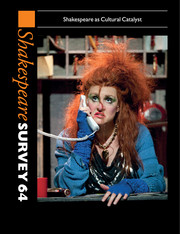Book contents
- Frontmatter
- CONTENTS
- ILLUSTRATIONS
- The Commercial Bard: Business Models for the Twenty-First Century
- International Innovation? Shakespeare as Intercultural Catalyst
- Brand Shakespeare?
- Global Shakespeare 2.0 and the Task of the Performance Archive
- An International Database of Shakespeare on Film, Television and Radio
- ‘Sounds and Sweet Airs’: Music in Shakespearian Performance History
- Using Shakespeare with Memes, Remixes and Fanfic
- ‘Pretty Much how the Internet Works’; or, Aiding and Abetting the Deprofessionalization of Shakespeare Studies
- Catalysing What? Historical Remediation, the Musical, and What of Love's Labour's Lasts
- Kabuki Twelfth Night and Kyogen Richard III: Shakespeare as a Cultural Catalyst
- The Sonnets as an Open-Source Initiative
- ‘A Stage of the Mind’: Hamlet on Post-War British Radio
- Post-Textual Shakespeare
- I am What I am Not: Identifying with the Other in Othello
- Desdemona's Book, Lost and Found
- Non-Catalyst and Marginal Shakespeares in the Nineteenth-Century Revival of Catalan-Speaking Cultures
- Shakespeare, Mácha and Czech Romantic Historicism
- An Irish Catalysis: W. B. Yeats and the Uses of Shakespeare
- François-Victor Hugo and the Limits of Cultural Catalysis
- ‘You Taught me Language’: Shakespeare in India
- There is Some Soul of Good: An Action-Centred Approach to Teaching Shakespeare in Schools
- The Royal Shakespeare Company as ‘Cultural Chemist’
- Shakespeare at the White Greyhound
- Dark Matter: Shakespeare’s Foul Dens and Forests
- What We Hear; What we see: Theatre for a New Audience's 2009 Hamlet
- Narrative of Negativity: Whig Historiography and the Spectre of King James in Measure for Measure
- Québécois Shakespeare goes Global: Robert Lepage's Coriolan
- Endless Mornings on Endless Faces: Shakespeare and Philip Larkin
- Shakespeare Performances in England 2010
- Professional Shakespeare Productions in the British Isles, January–December 2009
- The Year’s Contribution to Shakespeare Studies
- INDEX
- References
Shakespeare, Mácha and Czech Romantic Historicism
Published online by Cambridge University Press: 28 November 2011
- Frontmatter
- CONTENTS
- ILLUSTRATIONS
- The Commercial Bard: Business Models for the Twenty-First Century
- International Innovation? Shakespeare as Intercultural Catalyst
- Brand Shakespeare?
- Global Shakespeare 2.0 and the Task of the Performance Archive
- An International Database of Shakespeare on Film, Television and Radio
- ‘Sounds and Sweet Airs’: Music in Shakespearian Performance History
- Using Shakespeare with Memes, Remixes and Fanfic
- ‘Pretty Much how the Internet Works’; or, Aiding and Abetting the Deprofessionalization of Shakespeare Studies
- Catalysing What? Historical Remediation, the Musical, and What of Love's Labour's Lasts
- Kabuki Twelfth Night and Kyogen Richard III: Shakespeare as a Cultural Catalyst
- The Sonnets as an Open-Source Initiative
- ‘A Stage of the Mind’: Hamlet on Post-War British Radio
- Post-Textual Shakespeare
- I am What I am Not: Identifying with the Other in Othello
- Desdemona's Book, Lost and Found
- Non-Catalyst and Marginal Shakespeares in the Nineteenth-Century Revival of Catalan-Speaking Cultures
- Shakespeare, Mácha and Czech Romantic Historicism
- An Irish Catalysis: W. B. Yeats and the Uses of Shakespeare
- François-Victor Hugo and the Limits of Cultural Catalysis
- ‘You Taught me Language’: Shakespeare in India
- There is Some Soul of Good: An Action-Centred Approach to Teaching Shakespeare in Schools
- The Royal Shakespeare Company as ‘Cultural Chemist’
- Shakespeare at the White Greyhound
- Dark Matter: Shakespeare’s Foul Dens and Forests
- What We Hear; What we see: Theatre for a New Audience's 2009 Hamlet
- Narrative of Negativity: Whig Historiography and the Spectre of King James in Measure for Measure
- Québécois Shakespeare goes Global: Robert Lepage's Coriolan
- Endless Mornings on Endless Faces: Shakespeare and Philip Larkin
- Shakespeare Performances in England 2010
- Professional Shakespeare Productions in the British Isles, January–December 2009
- The Year’s Contribution to Shakespeare Studies
- INDEX
- References
Summary
This article is an attempt to examine, in Ton Hoenselaars's words, one of the ‘countless traces…of foreign cultural and ideological encounters with [Shakespeare's] histories’, focusing on the capacity of Henry IV, Part 2 ‘to mediate in non-English processes of national formation and preservation’. Despite detailed attention paid to one of these traces, the influence of Henry IV, Part 2 on the dramatic fragments of the leading Czech Romantic Karel Hynek Mácha (1810–36), my objective is more general: to study the potential of Shakespeare's histories to transform historical awareness in the context of the early nineteenth-century European Romantic nationalist movements. Specifically, I am interested in the way Mácha's use of Henry IV, Part 2 in his project of historical dramas facilitated an important change in his understanding of Czech history: a shift from perceiving it as a predetermined ‘providential’ narrative of national emancipation to a more ‘realistic’ ‘concern with history as processes and the inner necessities of historical change’. As the exploration of Mácha's reading and transformation of Henry IV, Part 2 will show, this change of historical awareness challenged not only the simplistic and utopian perception of Czech political identity but also the early nineteenth-century position of Shakespeare as a supreme literary and dramatic authority.
It is no surprise that the productions or translations of the histories did not appear in the period of early Czech appropriation of Shakespeare (1782–1807), when tragedies (Macbeth, King Lear) and comedies (The Merchant of Venice) were mainly seen as educational tools facilitating the spread of literacy. In 1792, the preface to a Czech translation of a German adaptation of King Lear pointed out the meaning of theatre for the education of the people, and amplified Friedrich Schiller's argument in favour of the communal nature of theatre and its role as a seedbed for the people's cultural growth.
- Type
- Chapter
- Information
- Shakespeare Survey , pp. 199 - 207Publisher: Cambridge University PressPrint publication year: 2011

